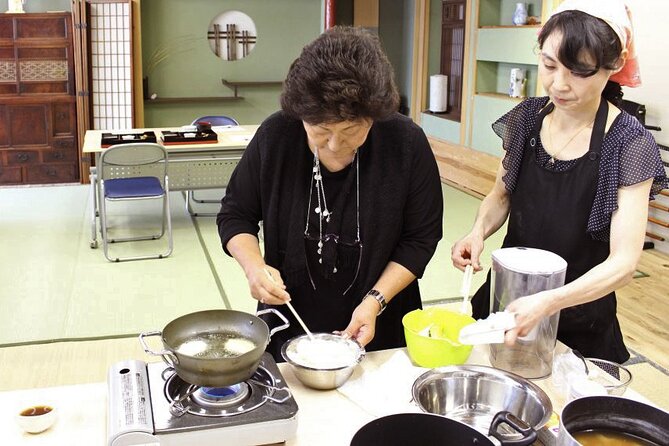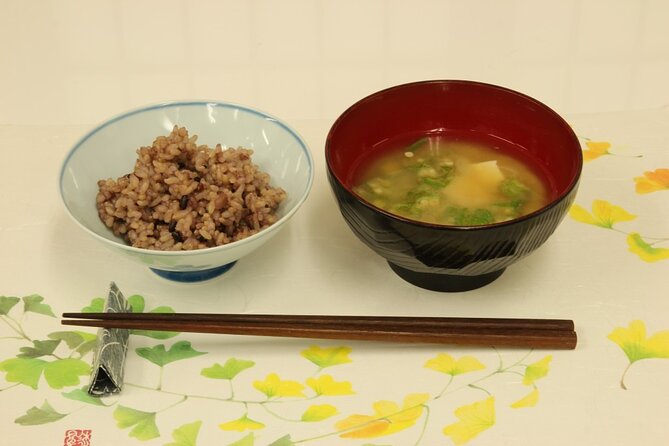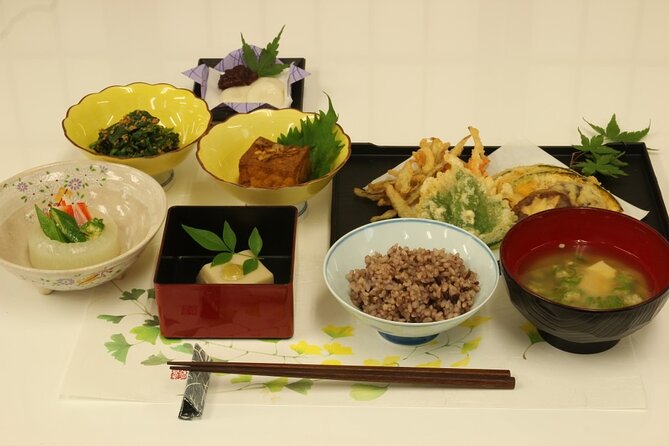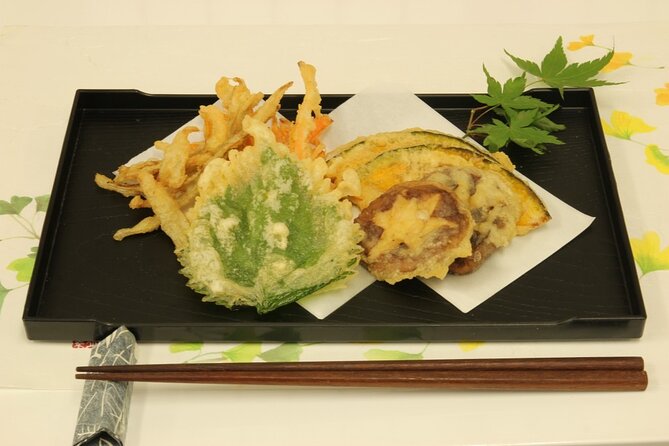In the realm of culinary experiences, there exists a hidden gem that transports participants to a world of ancient traditions and mindful cooking. Enter Shojin Ryori: Buddhist Vegetarian Cooking Experience.
This captivating activity offers a glimpse into the art of Buddhist vegetarian cuisine, allowing individuals and small groups to enjoy a cultural and culinary adventure. With highly skilled instructors leading the way, participants can unlock the secrets of this age-old practice while indulging their senses in a 2-hour and 30-minute cooking session.
Located conveniently near public transportation, the Kikai Shinko Kaikan building serves as the meeting point for this enlightening journey. Whether you’re a seasoned chef or a beginner, Shojin Ryori promises to inspire and enlighten, forging a deep connection between food and spirituality.
- Good To Know
- Pricing and Booking
- Meeting Point and End Point
- What To Expect
- Additional Information
- Cancellation Policy
- Common Questions
- Is Prior Cooking Experience Required to Participate in the Shojin Ryori Cooking Experience?
- Are There Any Age Restrictions for the Shojin Ryori Cooking Experience?
- Can I Bring My Own Ingredients to the Cooking Experience?
- Are There Any Specific Dress Code Requirements for the Shojin Ryori Cooking Experience?
- Are Cameras or Photography Allowed During the Cooking Experience?
- The Sum Up
- More Cooking Classes in Tokyo
- More Tour Reviews in Tokyo
- Looking for something different? Other Tokyo activities we've written about
Good To Know

- Shojin Ryori offers a glimpse into the art of Buddhist vegetarian cuisine
- Highly skilled instructors lead a 2-hour and 30-minute cooking session
- Participants can fully enjoy the art of Shojin Ryori
- The experience is engaging, informative, and adventurous
Pricing and Booking

The starting price for the Shojin Ryori: Buddhist Vegetarian Cooking Experience is $117.47. This unique culinary adventure offers group size options and a Lowest Price Guarantee, ensuring that everyone can enjoy this immersive experience without breaking the bank. Whether you’re traveling solo or with a group of friends, the Shojin Ryori experience caters to all.
By selecting your preferred date and number of travelers, you can easily book your spot and secure the best price available. The instructors will meet you at the main entrance of the Kikai Shinko Kaikan building, ready to guide you through the art of Buddhist vegetarian cooking.
With a maximum of 8 travelers per tour, you can expect an intimate and personalized experience. Don’t miss out on this incredible opportunity to explore the world of Shojin Ryori and expand your culinary horizons.
Want to learn local cooking? Other Tokyo cooking classes we've covered
Meeting Point and End Point

You can meet the instructor for the Shojin Ryori: Buddhist Vegetarian Cooking Experience at the main entrance of the Kikai Shinko Kaikan building on the 1st floor. This is the designated meeting point where you’ll gather with the rest of the group before embarking on your culinary adventure.
However, if you have difficulty finding the instructor, there’s an alternative meeting location. You can visit True Japan Tour on the B1 floor of the building, specifically in Room# B109. This will ensure that you don’t miss out on this unique cooking experience.
It’s important to note that the activity is wheelchair accessible, providing easy accessibility for wheelchair users. So, regardless of your mobility needs, you can fully enjoy the Shojin Ryori: Buddhist Vegetarian Cooking Experience.
The activity will conclude back at the meeting point, allowing you to reflect on the delicious dishes you’ve created.
What To Expect
Visitors can anticipate a 2 hours 30 minutes approximate duration for the Shojin Ryori: Buddhist Vegetarian Cooking Experience. During this immersive culinary adventure, you will have the opportunity to learn ancient cooking techniques and prepare traditional Buddhist vegetarian dishes. The experience is designed to be engaging, informative, and adventurous, allowing visitors to explore the rich cultural heritage of Japan. To enhance the experience, it is recommended to bring the following items:
| What to bring | Cooking techniques |
|---|---|
| Comfortable clothing and shoes | Knife skills |
| Apron | Seasoning and flavoring |
| Hair tie (for those with long hair) | Food preparation |
| Notepad and pen for taking notes | Plating and presentation |
With these tools and techniques, visitors can fully enjoy the art of Shojin Ryori and discover the beauty of Buddhist vegetarian cuisine.
Additional Information
Participants can find important details regarding the Shojin Ryori: Buddhist Vegetarian Cooking Experience in the Additional Information section. Here are three important things to know:
Accessibility requirements: The cooking experience is wheelchair accessible, with surfaces and transportation accommodating individuals with mobility needs. This ensures that everyone can fully participate and enjoy the activity without any limitations.
Dietary restrictions: It’s essential to inform the organizers in advance about any dietary requirements or requests. This ensures that they can make the necessary arrangements to accommodate specific dietary restrictions, such as allergies or food preferences. By providing this information beforehand, participants can have a worry-free and enjoyable experience.
Maximum number of travelers: The tour/activity has a maximum capacity of eight travelers per session. This allows for a more intimate and personalized experience, ensuring that each participant receives sufficient attention and guidance from the instructor.
Cancellation Policy
The cancellation policy for the Shojin Ryori: Buddhist Vegetarian Cooking Experience can be found in the article. When it comes to cancellations, the process is straightforward.
If you need to cancel your reservation, you can do so up to 24 hours in advance and receive a full refund. However, it’s important to note that any cancellations made less than 24 hours before the start time won’t be eligible for a refund.
Plus, please keep in mind that changes to your reservation can’t be accepted less than 24 hours before the start time. To ensure a hassle-free cancellation process, make sure to cancel your booking at least 24 hours before the scheduled start time.
This way, you can rest assured knowing that the refund policy is fair and transparent.
- 1 Day Private Nikko World Heritage Tour (Charter) – English Speaking Driver
- Akihabara Tailor-made Tour for Anime Fans
- Tokyo Go-Kart Rental With Local Guide From Akihabara
- International Party Bar & Karaoke Experience in Ginza
- Private Customizable Walking Tour of Tokyo
- Private Ginza Architecture Walking Tour
Common Questions
Is Prior Cooking Experience Required to Participate in the Shojin Ryori Cooking Experience?
No prior cooking experience is required to participate in the Shojin Ryori cooking experience. Participants will learn cooking techniques and the cultural significance of this Buddhist vegetarian cuisine, making it a rewarding adventure for all.
Are There Any Age Restrictions for the Shojin Ryori Cooking Experience?
Yes, there are no age restrictions for the cooking experience. Prior cooking experience is not required, making it accessible and enjoyable for people of all ages to learn and participate in the culinary adventure.
Can I Bring My Own Ingredients to the Cooking Experience?
No, participants cannot bring their own ingredients to the cooking experience. However, the Shojin Ryori: Buddhist Vegetarian Cooking Experience offers a variety of vegetarian options using fresh, locally sourced ingredients for a truly authentic culinary adventure.
Are There Any Specific Dress Code Requirements for the Shojin Ryori Cooking Experience?
There are no specific dress code requirements for the Shojin Ryori cooking experience. However, it is recommended to wear comfortable and suitable attire that allows ease of movement in the kitchen.
Are Cameras or Photography Allowed During the Cooking Experience?
Cameras and photography are allowed during the cooking experience. However, participants are advised to be mindful of the cultural significance of Shojin Ryori and respect the instructor’s instructions regarding when and where to take photos.
The Sum Up

To sum it up, the Shojin Ryori: Buddhist Vegetarian Cooking Experience offers a unique and immersive way to explore the ancient tradition of Buddhist vegetarian cuisine.
With experienced instructors and a focus on mindfulness and simplicity, participants are sure to have an enlightening and inspiring culinary adventure.
Whether you’re a seasoned chef or a beginner in the kitchen, this activity promises to be a memorable and enriching experience.
Don’t miss the chance to explore the world of Shojin Ryori and discover the deep connection between food and spirituality.
More Cooking Classes in Tokyo
- Real Flower Cake Cooking Experience in Nerima,Tokyo
- Tokyo: Sushi and Ramen Cooking Class with Sake Pairing Set
- Tokyo: Tsukiji Market Walking Tour & Sushi Cooking Class
- Tokyo: Easy Ramen Cooking Experience in Kabukicho, Shinjuku
- Private Gluten-Free Japanese Cooking Class in Tokyo Japan
- Tokyo: Small Family Cooking market Experience by local host
More Tour Reviews in Tokyo
Looking for something different? Other Tokyo activities we've written about
- Tokyo: Ikigai Matcha Tour with VR Experience
- Tokyo: Okonomiyaki & Gyoza with Local Supermarket Tour
- From Tokyo: Tokyo Private Tour with Temples & Towers
- Tokyo: Calligraphy Experience Ginza
- Tokyo Top Highlights 3h Guided E-bike Tour
- Tokyo & Nagano: Snow Monkey & Zenkoji Temple Adjustable Tour
- Akihabara Ultimate Anime & Gaming Tour with Maid Café Experience
- TOKYO: Tailored Gardens tour with Pro Gardener by E-bike -BASIC
- Real Flower Cake Cooking Experience in Nerima,Tokyo
- Tokyo:Shinjuku Ni-chome LGBTQ+ Local Bar Hopping Tour
- Tokyo Pop Culture & Tradition Tour: Meiji Shrine to Harajuku
- Tokyo Omakase Sushi Class®, reimagined through dialogue
